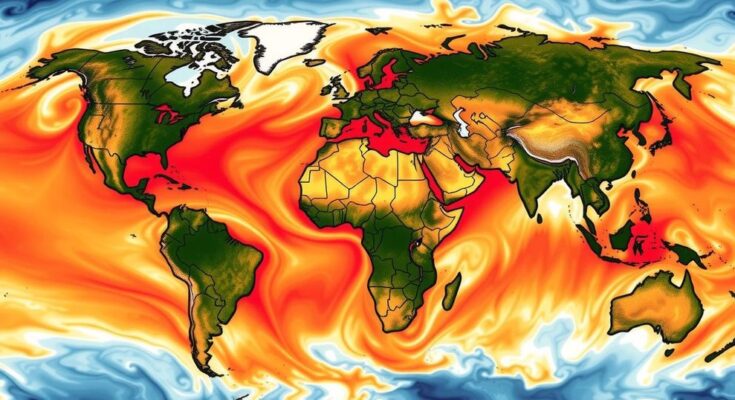The World Meteorological Organization predicts that 2024 will be the warmest year on record, continuing a decade of unprecedented heat driven by human activities. Severe weather events in 2024 have led to numerous deaths and widespread displacement. The current level of human-induced warming stands at 1.3°C, with forecasts indicating a likely breach of the 1.5°C target in the coming years.
The World Meteorological Organization (WMO) has announced that 2024 is anticipated to become the warmest year recorded, marking the conclusion of a decade characterized by record-breaking heat attributed primarily to human activities. WMO Secretary-General Celeste Saulo emphasized the severe implications of climate change witnessed throughout the year, including extreme weather events such as record rainfall and devastating tropical cyclones. The repercussions have included significant loss of life, with at least 3,700 deaths attributed to climate-related disasters, alongside the displacement of millions.
Climate change has exacerbated heat exposure dramatically, contributing to an additional 41 days of dangerous heat this year, predominantly affecting small island nations and developing states with minimal resources for adaptation. UN Secretary-General António Guterres highlighted that recent years have witnessed the top ten hottest years on record, calling this a climate crisis that requires urgent action to mitigate rising emissions and foster a renewable energy transition.
The WMO reported that the current human-induced warming level stands at 1.3°C, with projections indicating a probable temporary breach of the 1.5°C threshold in the coming five years. The latest UN climate conference has not established sufficient benchmarks to effectively curtail spiraling emissions, which further complicates the global climate response. Moving forward, the WMO’s Global Greenhouse Gas Watch initiative will improve monitoring of greenhouse gas concentrations to assist nations in managing their climate impact and enhancing early warning systems for extreme weather events.
The announcement from the World Meteorological Organization regarding 2024’s expected temperature records highlights the growing urgency surrounding climate change, which has shown increasingly dangerous patterns over the past decade. This context is critical when understanding the implications of rising global temperatures and the humanitarian crises provoked by extreme weather events. The WMO emphasizes the intertwining nature of human actions and climatic shifts, pointing towards a future that necessitates immediate action to mitigate emissions and support adaptation efforts.
In conclusion, the impending record temperatures for 2024 underscore the severe impacts of climate change, as articulated by both the WMO and UN Secretary-General António Guterres. The years of unprecedented heat and associated extreme weather events signify a pressing need for global cooperation in emissions reduction and climate adaptation strategies. As nations confront these challenges, enhanced monitoring and early warning systems will be vital in safeguarding communities against future climate impacts.
Original Source: healthpolicy-watch.news




